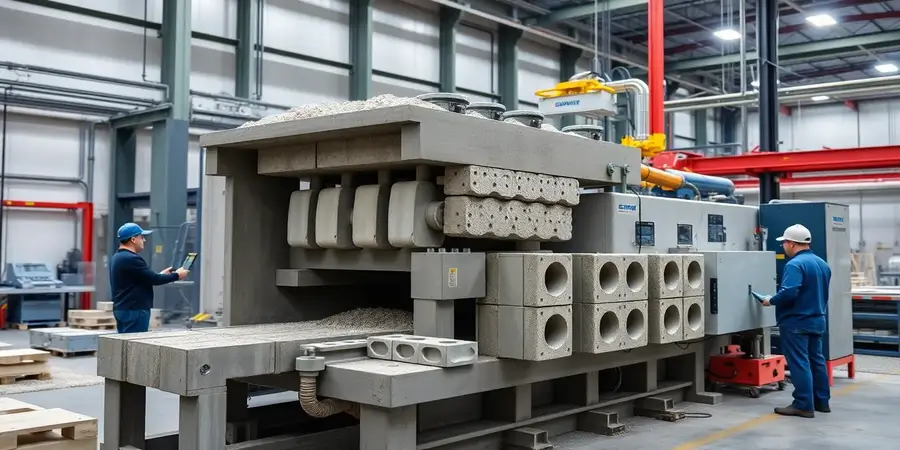A Concrete block making machine automates the production of uniform concrete blocks for construction projects. These machines streamline the mixing, moulding, and curing processes whilst ensuring each block meets strict quality standards. Construction teams benefit from reduced manual labour, faster production times, and consistent block dimensions. This technology supports various building applications from residential housing to commercial developments.
Understanding What Is a Concrete Block Making Machine
A concrete block making machine automates the shaping of concrete into blocks for use in construction. Equipment forms blocks by compressing a concrete mix in molds, producing consistent units that meet dimensional standards. Machines handle raw materials like cement, sand, and gravel, ensuring accurate batching and thorough mixing. Hydraulic or mechanical systems then compact and mold the mixture into specified block shapes and sizes.
Production cycles, ranging from less than 30 seconds to about 2 minutes per block, depend on machine type. Semi-automatic and fully automatic models support project needs from small-scale local projects to large-scale industrial applications. Equipment options allow for production of hollow, solid, paving, and interlocking blocks, with mold changes facilitating swift transitions between block types.
Lontto, operating in Chicago and globally, supplies block making machines equipped with advanced controls and efficient output rates for diverse building requirements. Their machines integrate energy-efficient drives, durable steel frame construction, and user-friendly interfaces. Advanced models monitor quality and production metrics in real time, aiding compliance with international construction standards.
Concrete block making machines streamline block production, lower labor input, and maintain tight tolerances. Businesses gain improved block uniformity and significantly higher daily production compared to manual fabrication. Construction teams use these machines to accelerate schedules and optimize resource allocation.
Key Components and Features
A concrete block making machine uses advanced systems to automate production from raw materials to finished blocks. Each component supports both efficiency and block quality standards.
Main Parts of the Machine
- Batching Machine: Measures and feeds cement, sand, and gravel with high precision to guarantee mix consistency in each batch.
- Mixer: Integrates ingredients using controlled cycles for homogenous concrete, supporting block uniformity and strength.
- Mold System: Includes interchangeable steel molds for hollow, solid, paving, or custom block shapes made to industry sizing standards.
- Vibrating Table/Shaker: Removes air voids and compacts material inside the mold to boost density and structural integrity.
- Compression Mechanism: Provides hydraulic or mechanical force for forming solid, durable blocks at industrial output rates.
- Control System: Supports programmable logic controllers (PLC) and safety interlocks that maintain process accuracy and operator safety.
Lontto machines in Chicago include robust safety controls and modular components for streamlined maintenance and operational uptime.
Types of Concrete Block Making Machines
| Type | Description | Use Case Example |
| Stationary Machines | Fixed installation, high capacity, hydraulically driven; handles mass production | Urban housing developments |
| Mobile Machines | Wheeled or portable frame, moderate throughput; relocates to project sites | Rural or temporary construction |
Stationary models suit continuous industrial block output, supporting daily demand over 10,000 units when fitted with automated palletizing. Mobile units operate at lower production rates, about 1,500 to 4,000 blocks per 8-hour shift, and are useful for remote or small-scale projects. Lontto supplies both types, with energy-efficient drives, rapid mold change systems, and Chicago-based service support.
How a Concrete Block Making Machine Works
A concrete block making machine uses a sequence of mechanical steps to produce concrete blocks with consistent dimensions and strength. Modern models like those from Lontto in Chicago combine automated systems and robust construction for high output.
Step-by-Step Process
- Molds Setup: Steel molds shaped for the required block size are fixed in the machine. Lontto machines support rapid mold changes for different product types.
- Material Feeding: Aggregates such as sand, cement, and gravel enter the feeder system in measured proportions. Automatic dosing ensures accuracy.
- Mixing: The batching mixer combines dry materials with water, producing a uniform concrete mix.
- Block Filling: The prepared mix fills the press molds by conveyor or hopper.
- Compacting: Hydraulic rams or vibrating plates compress the mix, eliminating air gaps and boosting density. Lontto machines use efficient vibratory systems designed for US standards.
- Curing Station: Molded blocks are transferred to a curing area for hardening through controlled humidity.
- Demolding: Once cured, blocks are automatically ejected from the mold. Semi-automatic and fully automatic machines manage this with minimal intervention.
- Block Transport: Conveyors or forklifts move finished blocks to storage, ready for distribution.
Production rates can reach up to 2,000 blocks per hour, meeting high construction demands. Lontto offers service support from its Chicago facility, ensuring prompt parts and technical assistance.
Advantages of Using Concrete Block Making Machines
Concrete block making machines provide rapid production and streamlined handling of masonry units. Automated operation raises daily output—stationary Lontto models in Chicago reach up to 2,000 blocks per hour while minimizing manual intervention.
Uniformity in block dimensions and strength results from precise compression and consistent molding cycles. Quality assurance is built in since each block matches set tolerances for loadbearing or non-loadbearing walls. Lontto equipment includes real-time quality monitoring, supporting compliance with U.S. and global standards.
Labor costs drop as operators manage multiple processes—batching, feeding, molding, and demolding—with limited staffing. Efficient batching and mixing reduce material waste, maximizing cement, sand, and aggregate yields.
Versatility in production is achieved, as block making machines allow quick mold changes to produce hollow blocks, interlocking pavers, and solid bricks. Lontto’s rapid-change mold frames help construction firms meet different project needs without equipment downtime.
Durability is ensured by reinforced steel frames, abrasion-resistant components, and energy-saving drives. Lontto machines withstand harsh worksite conditions, enabling continuous use over extended service life.
Sustainability advances through reduced waste, lower emissions, and recycling features. Local block manufacturing lowers transportation costs, meeting construction schedules faster and supporting regional jobs.
| Advantage | Context Example | Lontto Feature |
| Productivity | 2,000+ blocks/hr in Chicago | Automated batch-to-cure cycle |
| Quality Uniformity | Consistent block size and strength | Real-time QA monitoring |
| Cost Efficiency | Reduced labor, material savings | Efficient batching/mixing |
| Versatility | Hollow, solid, paver shapes | Rapid mold change system |
| Durability | Continuous operation, low wear | Heavy-duty frame, long service life |
| Sustainability | Local jobs, less waste | Energy-efficient, eco-friendly mode |
Concrete block making machines, especially those from Lontto’s Chicago facility, create scalable solutions for contractors looking to optimize supply chains, reduce costs, and maintain construction standards.
Applications in Construction
Concrete block making machines support key construction sectors by manufacturing masonry units for specific project needs. Residential buildings use blocks made by these machines for walls, foundations, and interior partitions, increasing strength and thermal insulation. Commercial projects, like office complexes and shopping malls, apply machine-produced blocks for exterior facades, load-bearing walls, and decorative partitions, creating cohesive structural systems.
High-rise structures—including hotels, hospitals, and apartment towers—require blocks with closely controlled compressive strength and uniform dimensions, which the machines consistently produce. Affordable housing developments benefit from machine efficiency, as up to 2,000 blocks per hour support high-volume, low-cost construction, reducing build times. Public infrastructure relies on machine-made products for pavement, kerbstones, road barriers, and retaining walls, with output versatility for different shapes and sizes.
Lontto, operating a service and support center in Chicago, provides stationary and mobile machines for both urban and remote construction environments, covering jobsite constraints and project scales. Contractors use Lontto’s fully automatic models to meet tight timelines and maintain quality standards across schools, hospitals, and infrastructure projects, while service support ensures minimal downtime during intensive production periods.
Factors to Consider When Choosing a Concrete Block Making Machine
Production capacity determines how many blocks the machine produces daily, with output ranging from 8,000 to over 20,000 blocks for top industrial models. Block dimensions and types define if the unit can handle hollow, solid, or paver blocks, matching project requirements for residential, commercial, or infrastructure work. Automation level impacts investment and labor, as fully automatic systems reduce manual work but command higher prices, while semi-automated or manual models fit lower budgets and smaller teams.
Durability of molds affects long-term operating costs, with steel molds lasting longer than aluminum, cutting downtime on high-volume production. Power requirements need checking to confirm supply compatibility—automatic machines often call for higher wattage, a factor Lontto highlights in service consultations from Chicago. After-sales support matters for uninterrupted production, so choosing a supplier with accessible warranty, training, and technical backup keeps projects on schedule; Lontto provides on-site support and remote troubleshooting.
Cost and maintenance expenses factor in not just purchase price but servicing, part replacements, and operational overhead, influencing the return on investment for new equipment. These criteria support construction companies in aligning equipment—such as Lontto’s solutions—with their workflow, output goals, and support expectations.
| Factor | Details/Examples |
| Production Capacity | 8,000-20,000+ blocks/day; suitable for large or small-scale projects |
| Block Types | Hollow, solid, paver blocks; matches building and paving requirements |
| Automation Level | Manual, semi-automatic, fully automatic; impacts labor and investment |
| Mold Durability | Steel (high durability), aluminum (cost-effective, less lifespan) |
| Power Requirements | High-wattage for automation; confirm site compatibility; Lontto support |
| After-Sales Support | Warranty, training, service; Lontto offers local/remote technical assistance |
| Cost & Maintenance | Includes purchase, maintenance, part replacement, operational overhead |
Conclusion
Choosing the right concrete block making machine can transform construction efficiency and quality. With advanced automation and reliable performance these machines help contractors meet project demands while staying competitive in the industry.
Lontto’s range of machines offers flexible solutions for both large-scale and smaller projects. By investing in the right equipment construction teams are better equipped to deliver consistent results and adapt to evolving building needs.
Frequently Asked Questions
What is a concrete block making machine?
A concrete block making machine automates the process of producing concrete blocks by mixing, molding, and curing concrete. It ensures each block is high-quality and consistent in size and strength, reducing manual labor and increasing production speed in construction projects.
How does a concrete block making machine work?
The machine mixes raw materials like cement, sand, and gravel, then compresses the mixture in molds to form blocks. It uses vibration and compression to ensure each block is dense and uniform, followed by curing to achieve desired strength.
What are the main benefits of using a block making machine?
Key benefits include faster production, reduced manual labor, consistent block quality, lower material waste, and the ability to produce various block types quickly. These machines also help cut costs, support large-scale projects, and maintain high construction standards.
What types of concrete block making machines are available?
Block making machines come in stationary and mobile types. Stationary machines handle high-capacity mass production, while mobile machines are suitable for onsite, moderate output. There are also manual, semi-automatic, and fully automatic models to suit different needs.
What factors should I consider when choosing a concrete block making machine?
Consider production capacity, types and sizes of blocks needed, automation level, mold durability, power requirements, after-sales support, cost, and maintenance needs. Matching the machine to your project size and technical requirements is crucial for efficiency.
How many blocks can a concrete block making machine produce per day?
Depending on the model, machines can produce from 8,000 blocks per day to more than 20,000 with top industrial models. Production rates also depend on automation level and block size.
Can these machines produce different block shapes and sizes?
Yes, machines are equipped with interchangeable molds that allow quick changes between different block types and sizes, such as hollow blocks, solid blocks, and decorative blocks, depending on project requirements.
Are concrete block making machines energy efficient?
Modern machines, like those from Lontto, are designed with energy-efficient drives and components to minimize power consumption while maintaining high output and reliable performance on any worksite.
What construction projects benefit most from these machines?
Concrete block making machines are used in residential, commercial, and public infrastructure projects, including foundations, walls, schools, hospitals, and high-rise buildings, wherever strong, uniform masonry blocks are needed fast.
Does Lontto offer after-sales service and support?
Yes, Lontto provides comprehensive after-sales service, including technical support, spare parts, and maintenance from its Chicago facility, ensuring minimal downtime during intensive production periods.














